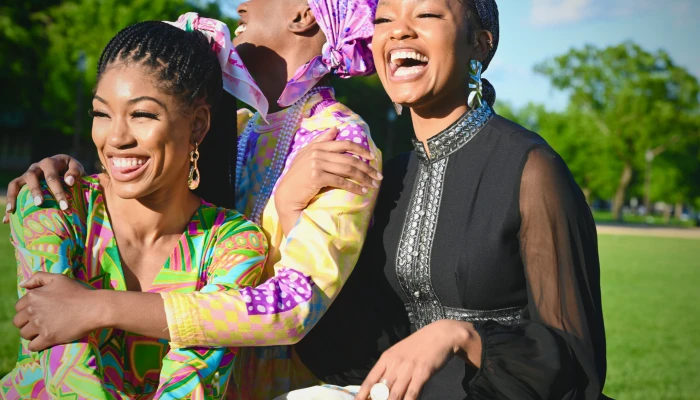Microaggressions and their impacts: my lived experience

I am an African American woman with Hispanic and white heritage too. I’m a swimmer, university graduate (Science and Psychology) and an avid equity, diversity and inclusion champion.
When I was invited to write this article, I was thrilled by the opportunity to talk about a topic close to my heart. Having had countless lived experiences with racial and gender-based microaggressions, I have decided to speak a little from the heart before getting into the research behind microaggressions. So, I will start by talking about my own experience, then I will move on to addressing the question, “what on earth are microaggressions anyway?”
“How will you get your hair under that swim cap!”
At the age of 18 I took a chance on my athletic abilities and moved halfway across the US to swim for a university where I was offered a scholarship and hopeful for the future in my athletic career and academic career.
When I arrived on campus the culture was integrative and there was fair representation of most ethnicities, cultures, and backgrounds. All of which were the opposite of the culture I had expected when walking into my new athletic program. Before arriving, the university requires training for students regarding sexual harassment, equal opportunity, and other rights and responsibilities that students, instructors, and coaches should be aware of when working with university athletes. In other words, Basic Standard Protocol to protect the rights of all student athletes.
While the time I spent at the university wasn’t all bad, there were moments I felt I had become a victim to microaggressions and bias from coaches and teammates. I was the only African American on my swim team. This turned out to be a blessing and a curse. I was awarded a scholarship for multicultural ethnicities because I was Black, White and Hispanic. I was overqualified in the minority fields for sure and my teammates used that against me, for example, some of them would comment to the effect that I was only here to check a box off for the athletic department and the coaches. But I am more than a box they check off or write off. I am a human, an individual, and most importantly a person with feelings, emotions and a heart.
Throughout my duration there I experienced comments from my coaches such as “How are you going to fit that kind of hair under a swim cap” or comments like “you an amazing swimmer for being black” and one of the worst yet, a coach making me apologise to another athlete for pointing out that they made a stereotypical micro-aggressive comment on deck, that I took offence towards. It should be known that the athlete who has felt offended should never have to apologise to the oppressor for a comment they made that was offensive. This brings me to the topic of microaggressions, what they are and their impacts.
Microaggressions: the term, its origin and meaning
The origin of the term “microaggression” originated first in the 1970s to describe subtle insults and putdowns that African Americans experienced regularly during the period of integration in the United States. Since then, the term has been expanded towards any marginalised group.
Today, it is well understood that individuals use microaggressions to belittle other individuals or inadvertently make painful jokes towards a certain marginalised group or people. Microaggressions are defined as subtle “everyday” putdowns directed towards a specific group of people. Typically, microaggressions demean a person’s race, gender, sexual orientation, heritage, age or health.
A marginalised group includes any person, group or population outside of the accepted mainstream, normative standard. In most cases of discrimination or prejudice, the individual’s behaviour usually is clear and there is no grey area for interpretation. But as for microaggressions, they tend to be harder to identify, and some may not even realise such subtle comments are discriminatory.
There are many forms that a microaggressions can take. The three main subcategories are:
- Micro-assaults: This is when a person intentionally behaves in a discriminatory way while not intending to be offensive. An example is telling a racist joke, then saying, “I was just joking.”
- Micro-insults: This is a comment or action that is unintentionally discriminatory. For example, saying to an Indian doctor, “Your people must be so proud.”
- Micro-invalidations: This is when a person’s comment invalidates or undermines the experiences of a marginalised group. An example would be a white person telling a black person that “racism does not exist in this office” or that “this university does not allow racism,” when clearly there had been questionable comments, or statements made towards a certain race. In reality they are not allowed to judge what a black person deems as offensive or racist (MediLexicon 2023).
It is our job, everyone’s job, as responsible community members, to help drive change through speaking up when we see another individual instigating microaggressions towards another group or class of people.
Under these three main sub-categories falls other specific types of microaggressions such as racial microaggressions, sexist microaggressions, misogynistic microaggressions and heterosexist microaggressions. Some examples of microaggressions include but are not limited to:
- Treating someone as second class or below you because of their race, gender identity, or sexual orientation.
- Complimenting an individual on their English when they were raised in the United States, the UK or Australia – simply because they are not white.
- Using offensive terminology willingly and on purpose after being told it is not socially acceptable, for example, using derogatory phrase towards LGBTQIA+ individuals or racial slurs.
- Underrepresenting different races, gender identities, sexualities, and disabled individuals in the media, workplace, and community.
- Degrading an individual for believing a comment made is not discriminatory or prejudiced. For example, in the workplace a co-worker may say to a colleague that “you’re too sensitive” or “it’s not about race.” In some cases, the phrase “I don’t see color or race,” may be a micro-aggressive comment that some individuals may not accept because comments as such are denying who we are, what we know, and what we have experienced, and make an individual question their own perceptions and beliefs about themselves and cultures.
We’re all responsible
Lastly, though this is just a glimpse of micro-aggressive behaviour in my athletic experience, this does not limit the environment in which they can occur and does not limit who it can happen to. It is important to note that microaggressions happen far too often and they can happen in the workplace, in your sport, in your community, on a train, in grocery stores, and a variety of other settings as well. But it is our job, everyone’s job, as responsible community members, to help drive change through speaking up when we see another individual instigating microaggressions towards another group or class of people.
Nobody’s perfect and we all exemplify some biases from time to time. That does not mean our biases are inevitable or acceptable. It is more how we recognise the effects these biases have on other individuals and how they make them feel. If an individual is affected or offended by something you say it is your job as a human, who also does not want to be objectified, or marginalised, to untangle some of those negative or hurtful core thoughts and behaviours you hold, so that it can allow you to see another person’s point of view. This, I believe, combined with educating yourself and embracing unfamiliar cultures/perspectives, can begin to allow us to work towards a more inclusive and fairer workplace and community.
Deven Speed is a consulting instructional writer and researcher for Enmasse in the areas of diversity, equity and inclusion.
References
Bullying behaviors and attachment styles - Georgia Southern University. (n.d.). https://digitalcommons.georgiasouthern.edu/cgi/viewcontent.cgi?article=1444&context=etd
MediLexicon International. (n.d.). Microaggressions: Definition, types, and examples. Medical News Today. https://www.medicalnewstoday.com/articles/microagressions#classifications


